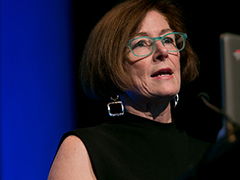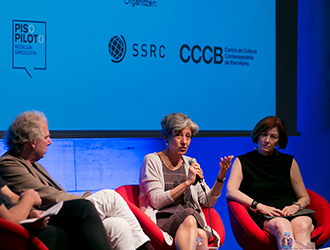Diane Davis, an American sociologist and geographer, and Charles Dyer Norton Professor of Regional Planning and Urbanism at Harvard University, reflects on the nature of public space giving special attention to the need for people to give sense to places in the city. Davis has worked for much of her career on Latin American countries and Mexico in particular. Her favourite public space is the Zócalo, the main square in Mexico City.
Shared Spaces recorded this conversation with Diane Davis in July 2015 when she visited the Centre of Contemporary Culture of Barcelona (CCCB) in order to participate in the debate “The Possible City: From Urban Planning to Democracy” at which Richard Burdett and Teresa Caldeira also spoke. The debate was part of “The Possible City" cycle, which was jointly organised with the Social Science Research Council, New York. Richard Sennett and Ira Katznelson were also guest speakers in the cycle on 2 and 3 July 2015.
In this short interview, Davis offers a highly synthetic account of her view of public space and the importance of analysing it from the citizens’ standpoint. Urban planning makes no sense if people, the citizens, do not appropriate the space. Hence, in Davis’ words, “physical spaces do not become public spaces until they are made so through the actions and activities of citizens”.
Davis continues, saying that her favourite public space is the Zócalo in Mexico City. She has written a large body of theoretical work on Latin American cities and chooses this large square because it is imbued with “the importance of history, memory and struggles over power”, all of which makes it a necessary space because it is part of a long story of claims from, and struggles of the citizens to make a better city. For her, “a space that becomes a historical archive is worth commemorating, celebrating and mantaining”.




